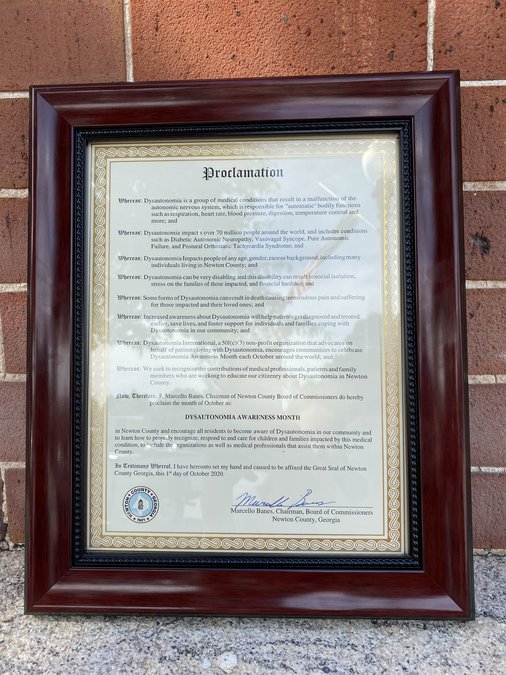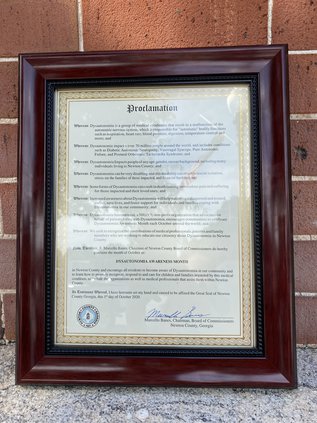OXFORD, Ga. — The teen's “unusual” symptoms began showing up in March 2018.
“We got her an Apple Watch that Christmas (2018) and it was through the Apple Watch we found out she had tachycardia,” said her mother, Allison Lee.
Tachycardia is a condition in which the heart beats faster than normal even when the person has not been exerting herself.
However, things for Shelby Lee “went downhill from there,” her mother said.
“She was developing many more new symptoms and we couldn’t find a doctor that knew what was causing all of them,” she said.
Shelby suffered with the condition for a year before knowing that it was dysautonomia, Mrs. Lee said.
After pediatric cardiologist Dr. Meghann McKane of Children’s Healthcare of Atlanta referred Shelby to Leslie Bishop of Sibley Heart Center Cardiology, Bishop diagnosed her with the neurological condition in January.
“It was scary to all of us not knowing what was wrong,” Mrs. Lee said. “It took us a year of being referred from one doctor to another until we finally were referred to someone who had knowledge of what Shelby has.”
Dysautonomia — pronounced “dis-oughta-know-me-uh,” Mrs. Lee said — is a general term for a group of disorders related to a malfunctioning autonomic nervous system, according to information from The Cleveland Clinic.
The autonomic nervous system is the part of the nervous system that controls involuntary body functions such as heart rate, blood pressure, breathing, digestion, body and skin temperature and more.
When the system does not function properly, it can lead to heart and blood pressure problems, breathing trouble, loss of bladder control and other problems, according to The Cleveland Clinic.
Mrs. Lee said Shelby “was so happy someone was telling her they knew what was wrong with her and could help.”
“When we left the doctor that day, she immediately knew she wanted to raise awareness,” she said.
“She started making a list of all the things she wants to do to help and she is working off that list today. She said to me, “Mom, I don’t want anyone else to have to go through what I went through, or maybe even worse, to get diagnosed.’”
Shelby is the daughter of Ryan and Allison Lee. She is a local volunteer for the advocacy group Dysautonomia International.
The homeschooled eighth-grader said she wanted to be active in educating and raising awareness about the disease rather than playing video games or other, typical activities of 13-year-olds.
“Even though it’s work, it’s what I want to do because it’s the right thing,” Shelby said. “I enjoy helping others.”
She also said she had “a choice” about what she wanted to do after her diagnosis.
“I can either sit and do nothing and only worry about myself, or I can raise awareness and educate others on dysautonomia, so that others don’t have to go through what I went through and they can get people diagnosed faster,” she said.
Shelby also created an Instagram page, dysautonomia_warrior_, to help raise awareness and to share her story to encourage others, her mother said.
“Shelby has always had a huge heart for helping others. Anyone that meets her says she has the sweetest spirit, with so much compassion for others,” Mrs. Lee said.
Chairman Marcello Banes of the Newton County Board of Commissioners proclaimed October as Dysautonomia Awareness Month in Newton County after meeting with Shelby.
He said he decided to sign the proclamation “to shine a light on something that is a concern to me.”
“To be honest, this was the first time I was made aware of dysautonomia and I thank Miss Shelby for bringing it to my attention,” Banes said.
“I learned this month that dysautonomia can sometimes be misdiagnosed. Miss Shelby Lee educated me that this disorder affects the neurological system.
“Our citizens and affected families need to be aware of and do individual research on other disorders that may play a part in unexplained sickness, diagnosis or misdiagnosis of people who are trying to find answers.”
Banes said he discovered the disorder is linked to conditions such as Parkinson’s disease and diabetes.
He said he also learned that when the autonomic nerves are damaged, it can cause very serious problems in one or more of the systems.
“Knowing this and being made aware of this condition, gives us other opportunities to do research and have an educated conversation with our physicians and specialists,” he said.
“I applaud her for making sure that we are all aware and ensuring that #OneNewton (Newton County) is educated on additional medical conditions that may affect our citizens, family members and friends,” Banes said.
Mrs. Lee said Shelby is still struggling with the disorder.
“There were times — and still are — Shelby’s heart rate is 170 just sitting in the car riding down the road.”
She said, in late June, Shelby started having issues with passing out.
“We are currently working with her specialist to try to get all her symptoms under control.
“There are many, many more symptoms Shelby has but there are too many to list. We are still adding to the list.”
For more information, visit www.dysautonomiainternational.org.







